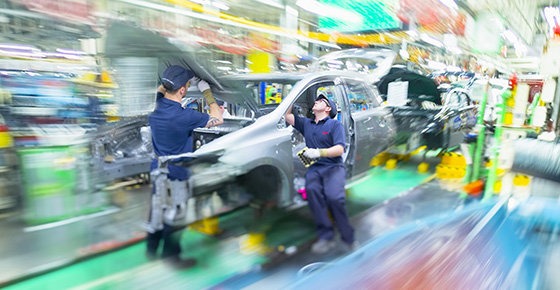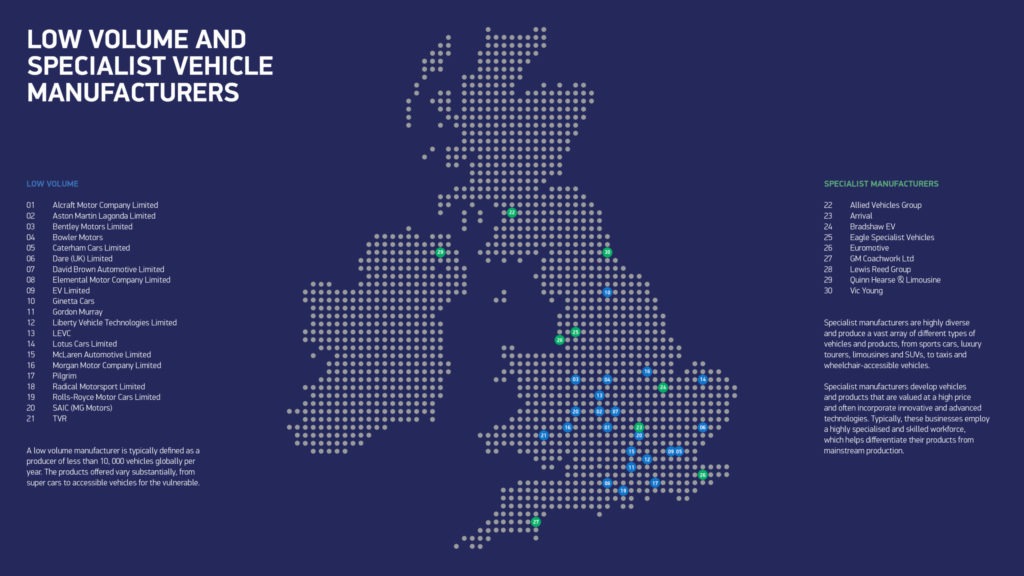UK’s successful specialist-vehicle sector needs support
20 July 2021

The UK’s low-volume and specialist-vehicle manufacturing sector is the most diverse in the world according to a new report published today by the country’s automotive body, the Society of Manufacturers and Traders (SMMT).
The SMMT’s ‘Low Volume and Specialist Vehicle Manufacturers’ report identifies the country as a ‘world leader’ in the production of low-volume, high-value vehicles. This encapsulates the likes of hypercars, campervans, limos, electric taxis, motorhomes, wheelchair-accessible vehicles and other luxury models.
Specialist manufacturers
The UK has links to some of the biggest brands such as Bentley, Aston Martin and Jaguar Land Rover (JLR). But alongside these well-known names, the country also plays host to some of the most important vehicle-conversion companies.
This specialist sector turned over roughly £4 billion last year (€4.6 billion), spent £625 million on R&D, employed more than 15,000 people, and produced over 28,000 products. Most of these vehicles were built to be exported. The SMMT calculates that in 2020, 87% of these specialist models were exported to overseas markets, including the EU, US, Asia and the Middle East.

However, just because the end product has such popularity overseas, does not mean manufacturing skips over local supply chains. This sector helps sustain a significant nationwide supply chain, supporting thousands of jobs. A significant number of components used are locally-sourced, and value added by conversion companies can add up to more than £15,000 on a single vehicle.
While this work might seem too niche to impact mass-market mobility, these specialists have often led the way in introducing new concepts and apply high-performance concepts to road vehicles. This includes aerodynamic designs, light-weight ideas, and safety features that will be track-tested before being brought to the mass market.
Big issues for small production
Yet, this successful sector is facing a mountain ahead of it. With governments the world over (like the UK and EU) confirming decarbonisation plans for the transportation sector, the low-volume and specialist manufacturers face a struggle.
This is because of longer-than-average production life-cycles, tight profit margins and occasional struggles sourcing new technology from third parties, which cannot be developed in-house. This transition will present significant costs, alongside the need to develop more advanced and connected vehicles. These smaller producers usually make less than 10,000 vehicles a year each for global markets but face the same regulations as the mass-market players.
‘The UK has a world-class automotive sector, and the many low-volume and specialist manufacturers are among its most valuable assets,’ said Mike Hawes, SMMT chief executive. ‘The industry is at a critical moment as companies transition at pace to a zero-emission future, and we must protect and preserve the diverse nature of these businesses which add to the lustre of the UK industry.’
To stay competitive, the SMMT argues the UK’s specialist manufacturers need barrier-free access to global markets, as well as an appreciation of the specific needs of these companies in terms of standards, targets and regulations. Therefore, the negation of new free-trade agreements (FTAs) needs to include these companies, the society explains.
‘Fundamental to the competitiveness of the sector is the need to ensure any regulation is appropriate and reflects the unique circumstances of these low-volume, high-value manufacturers,’ added Hawes. ‘This is particularly important as we negotiate new trade terms with key overseas markets, many of whom would look on enviously at our strengths in this sector. Furthermore, given the technological transition underway, these companies, like the rest of the industry, need specific support for workforce retraining and reskilling to ensure they are fit for the future.’



